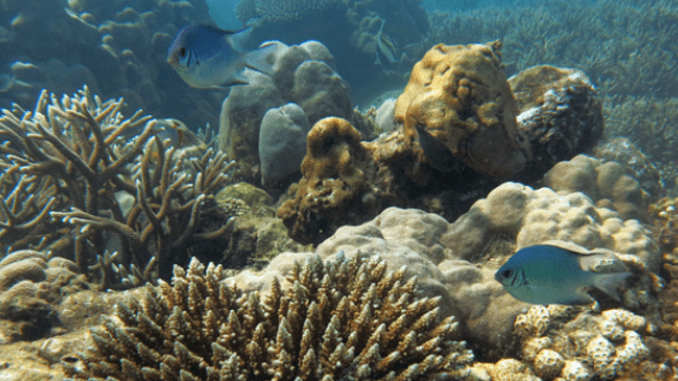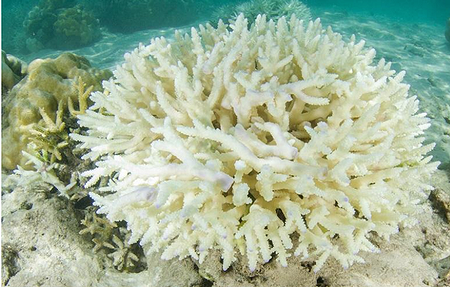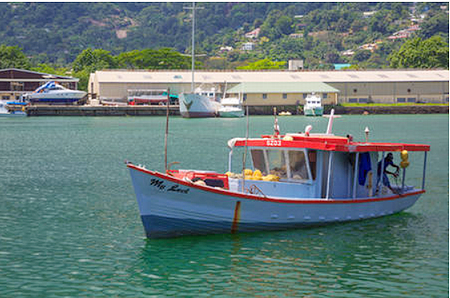
LANCASTER, UK, January 9, 2022 (ENS) – Coral reefs damaged by rising ocean temperatures appear to be more resilient than scientists have realized. An international team studying damaged reefs has discovered an unexpected bright spot of hope for communities who depend upon coral reef fisheries for food security.
Coral reef ecosystems support diverse small-scale fisheries, and the fish they catch are rich in micronutrients vital to the health of millions of people in the tropics.
More than six million people work in small-scale fisheries that rely on tropical coral reefs. Their catches help to feed hundreds of millions of coastal people in regions with high prevalence of malnourishment, which causes stunting, wasting and anaemia.
Yet, until now, the nutritional composition of coral reef fish catches, and how climate change might affect the nutrients available from reef fisheries, was not known.
The new study found that even after bleaching events kill off coral and transform the composition of reef ecosystems, coral reef small-scale fisheries can remain rich sources of micronutrients, unexpectedly richer in nutritional value for some minerals than unbleached corals yield.
This understanding is critical as continued global warming triggers more frequent and more severe coral bleaching events, placing greater stress on these vulnerable ecosystems.
Published in the current issue of the journal “One Earth,” the study was conducted by an international team including researchers from Australia, Canada, Mozambique, the Seychelles, and the United Kingdom.

Dr. James Robinson of Lancaster University in the UK led the research group. “Our findings underline the continuing importance of these fisheries for vulnerable coastal communities, and the need to protect against over-fishing to ensure long-term sustainability of reef fisheries,” he emphasized.
This study was able to access more than 20 years of long-term monitoring data from the Seychelles, where tropical reefs were damaged by a coral bleaching event in 1998 that killed an estimated 90 percent of the corals.
Following this mass-bleaching event, around 60 percent of the coral reefs recovered to a coral-dominated system, but 40 percent were transformed to reefs dominated by seaweeds.
These differences provided a natural experiment so the scientists could compare the micronutrients available from fisheries on reefs with two different climate-driven ecosystem compositions.
The scientists used a combination of experimental fishing, nutrient analysis, and visual surveys of fish communities in the Seychelles. They calculated that reef fish are important sources of selenium and zinc, and contain levels of calcium, iron and omega-3 fatty acids comparable to other animal foods, such as chicken and pork.
They also found that iron and zinc are more concentrated in fish caught on reefs that have been transformed after coral bleaching and are now dominated by macroalgae such as Sargassum seaweeds.
These seaweeds have high levels of minerals, which, researchers believe, is a key reason why the algal-feeding herbivorous fishes found in greater numbers on transformed reefs contain higher levels of iron and zinc.
Dr. Robinson said, “Coral reef fish contain high levels of essential dietary nutrients such as iron and zinc, so contribute to healthy diets in places with high fish consumption.”
“We found that some micronutrient-rich reef species become more abundant after coral bleaching, enabling fisheries to supply nutritious food despite climate change impacts,” he said.

Robinson believes that protecting catches from these local food systems “should be a food security priority.”
The researchers say their results underline the need for effective local management to protect the sustainability of reef fisheries, as well as policies that retain more of reef fish catches for local people and promote traditional fish-based diets.
These can help reef fisheries to best contribute to healthy diets across the tropics.
“Fish are now recognized as critical to alleviating malnutrition, particularly in the tropics where diets can lack up to 50 percent of the micronutrients needed for healthy growth,” said Professor Christina Hicks of Lancaster University, a co-author on the study.
“This work is promising because it suggests reef fisheries will continue to play a crucial role, even in the face of climate change,” Hicks suggested, “and highlights the vital importance of investing in sustainable fisheries management.”
Fisheries authorities in the region are getting serious about protecting their fishes, and they have financial help from the European Union.
Eight countries of the South-West Indian Ocean stepped up their collaboration in the fight against illegal fishing during the meeting of the Extended Regional Coordination Unit of the Regional Fisheries Surveillance Plan. This ERCU meeting brought together the Comoros, France/La Reunion, Kenya, Madagascar, Mauritius, Mozambique, Tanzania and Seychelles.
Held October 21, 2021 at the Savoy Seychelles Resort & Spa in Mahé, the ERCU meeting was marked by the announcement of “a grant close to €2 million for the region to carry on the effort in combatting illegal fishing,” by Vincent Degert, ambassador of the European Union to the Republic of Mauritius and the Republic of Seychelles.
Since 2007, these partner countries have been exchanging information and organizing joint fisheries surveillance patrols to ensure better surveillance of fishing resource exploitation activities in the region. These activities will be sustained for the next three years due to the EU’s support.
The micronutrient reef fish research findings are outlined in the paper, “Climate-induced increases in micronutrient availability for coral reef fisheries.”
Featured image: A recovering coral reef, Seychelles, 2021 (Photo by Professor Nick Graham, Lancaster University)



